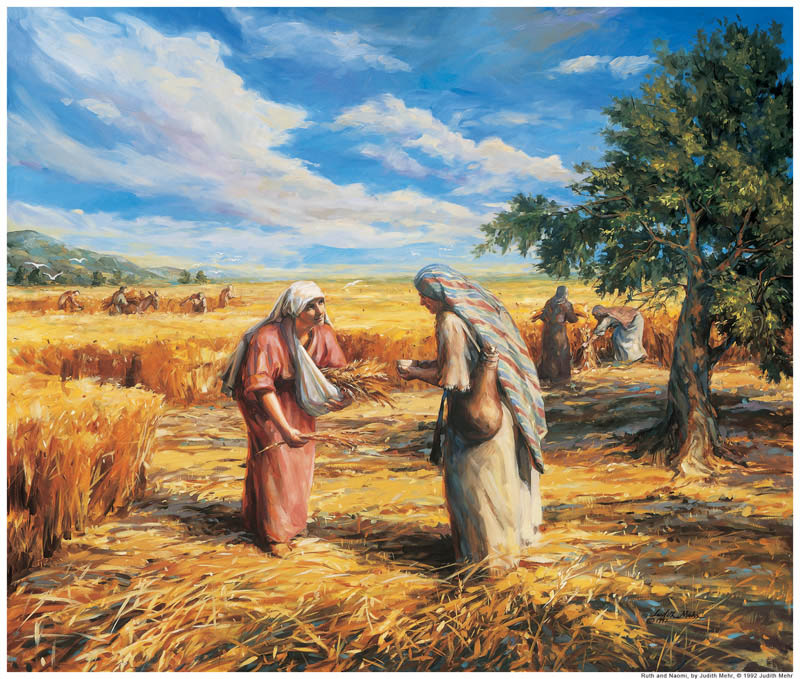In the Bible, we read of Ruth offering to glean the fields. After the harvesters were finished, the gleaning were left for the poor. These were much harder to gather and took significantly more work, but those who were hungry were willing to do this in order to get what they needed.
 We can apply this concept to our study of the scriptures. Most people study the scriptures rather casually and some Pew forum research has shown most people can’t answer even simple questions about the Bible. They look up the scriptures they’re taught in the Sunday School class or in a witnessing class, but they often don’t take the time to read them in context. Many people have never read the entire Bible from cover to cover, allowing them to understand the flow and growth of the gospel of Jesus Christ. Those who do are often meeting a challenge to read it in a certain amount of time and thus don’t have time to get past the surface teachings. The Bible is rich with information that can only be found by gleaning—gathering information slowly, piece by piece, and taking time to reflect on it.
We can apply this concept to our study of the scriptures. Most people study the scriptures rather casually and some Pew forum research has shown most people can’t answer even simple questions about the Bible. They look up the scriptures they’re taught in the Sunday School class or in a witnessing class, but they often don’t take the time to read them in context. Many people have never read the entire Bible from cover to cover, allowing them to understand the flow and growth of the gospel of Jesus Christ. Those who do are often meeting a challenge to read it in a certain amount of time and thus don’t have time to get past the surface teachings. The Bible is rich with information that can only be found by gleaning—gathering information slowly, piece by piece, and taking time to reflect on it.
I have been taking a scripture study class this year. Meant for students college age or older, we are spending the entire academic year on only sixty-three pages of scripture. We spent several months just on the creation, taking apart nearly every sentence in those few verses. At the beginning of the course, I wondered how we could take so long to study so little; now I am amazed at how much was in those sections that I missed when I was doing the initial harvesting. I have read the Bible all the way through multiple times, but I had not done this level of gleaning. Recently, I decided to counter the common goal of reading the scriptures quickly and am instead, setting a goal to read them slowly, gleaning from them all I can. Some days I read only a few verses, pondering what I learned and what those verses mean in my own life. Sometimes I stop reading to do some research. What are the other translation possibilities for this word? What other teachings are offered about this subject in other parts of the Bible? What do experts say about these verses?
In the Book of Mormon, a prophet named Nephi tells us that we should “liken” the scriptures. This means to ask ourselves, “What does this have to do with my life today? What did God want me to learn from this verse or story? How can I apply these teachings in my own life?”
Likening can be applied to the study of the Bible as well. Although the people of the Bible lived long ago, their lives and teachings have a great deal to teach us. If we read the stories just as stories, we miss the entire purpose of the Bible. Each one has something to teach us about our own lives. Noah built an ark because he was commanded to. First, though, he honored God’s command to preach repentance to the people and endured the mocking that came from both the preaching and the ark-building. Today, we don’t need to build an ark, but there is still a message for us in that story. As I study about Noah, I recognize in it the importance of listening to God’s messages, of the reason God sends prophets, of the importance of doing what God tells us to do even if others mock us. I learn that we need to know how to tell what comes from God, because if we don’t recognize His prophets, we will suffer the consequences.
I have spent a lot of time lately thinking about the Tower of Babel. It’s a very short story in the Old Testament, and yet I’ve discovered there are important messages tucked into the story. It’s most often told just as an explanation for why there are so many languages, but gleaning from the scriptures means to go beyond the obvious lesson. The people worked together in complete harmony to build this tower. Normally, harmony would be considered a good thing, as would cooperation and working towards a purpose. However, the purpose of the tower was not in keeping with God’s teachings. It was a very self-centered project, designed to make a name for themselves and to get into Heaven without meeting any of the requirements. They didn’t want to keep commandments, have faith in God, or honor Him. God destroyed the harmony by taking away their shared language. Unable to communicate, the workers began to argue, mistakes happened, and the project fell apart. The people dispersed, unable to figure out how to live together when they didn’t speak the same language.
Wanting to glean all I could from this small piece of the Bible, I read the few verses many times. Then I did some research and looked at the Jewish stories about the tower. I researched what my own religion taught on it. I am a member of The Church of Jesus Christ of Latter-day Saints, whose members are sometimes called Mormons, and the Book of Mormon has more to say on the Tower of Babel. The Book of Mormon tells of a small group of people who refused to participate in building this tower, understanding it was not a gospel-appropriate activity. When the languages were changing, two brothers prayed to have their language remain and also to preserve the languages of their friends. They left the area and eventually ended up in what is today called the Americas.
Then I spent some time thinking about it. Even when I moved on, I continued to think about this story and to write down my thoughts about the lessons to be learned. Here are some of my personal gleanings from this story. Your own gleanings might be different because they would be based on what is meaningful to you. They aren’t official Mormon doctrine; they are my own thoughts on the subject. Read them, however, might help you understand the process of gleaning even from a few small verses. You might want to start by rereading the story in the Bible yourself. It is found in Genesis 11 and is only nine verses.
What I pull from this story is that the Tower of Babel was, in essence, a pagan temple. They wanted to make a name for themselves, which might have been vanity or it might have meant taking on God’s name—but not doing it through God’s chosen procedures. They were building a temple without authority and in the Old Testament, we know that building a temple required authority and the supervision of a prophet.
From this, I learn that everything in God’s kingdom must be done with authority and permission from God. We can’t take it on ourselves to do something. All through the Bible, we see the importance of having leaders—prophets—chosen by God who have the authority to speak for God. No one working on the tower had that authority. They were simply taking charge on their own.
I learn that while cooperation and harmony are important, these things must be used for righteous purposes. Taking it a step further, I understand that everything we do in life must be done for righteous purposes. Doing good is a great thing, but only if done for the right reasons and only if it is done to honor God.
Some historical sources believe the builders of the tower were afraid of another flood. This was only a few generations after Noah’s ark was built. The bricks were a new invention, made of baked clay, and were waterproof. If a flood came, they could climb the tower to escape. The lesson here is that they did not trust God and so they went to elaborate lengths to try to avoid punishment for sin, but also to escape something God had already promised He wouldn’t do. If they had trusted Him, they wouldn’t have been afraid. If they had just been willing to keep the commandments, they wouldn’t have needed a tower. There are ties here to the story of Jonah trying to hide from God and ending up as fish food. We can’t hide from or escape God. If we are willing to keep the commandments, we don’t have any need or desire to hide from God.
One way to make your gleaning more useful is to write the findings down. Keeping a scripture journal, in which you write your thoughts about what you are reading, is a great way to get the most from your reading. Not only does it force you to slow down, but it also allows you to remember the thoughts you had as you read and to reference them when you read more on the same subjects. In future years you can return to those entries to see if you have any new ideas about the scriptures and stories you read.
Here’s a challenge for the new year: Read the scriptures from cover to cover…slowly, gleaning from them all you can. If you learn some life lessons from your reading, post them here. We’d love to hear what they are.
About Terrie Lynn Bittner
The late Terrie Lynn Bittner—beloved wife, mother, grandmother, and friend—was the author of two homeschooling books and numerous articles, including several that appeared in Latter-day Saint magazines. She became a member of the Church at the age of 17 and began sharing her faith online in 1992.






Thank you for sharing your definition of and findings on gleaning. This gives a clearer picture of gleaning. The Lord told me to glean his scriptures years ago, but I didn’t really know how until today.
This helps, thank you.
So glad this post was able to help you! We’d love to hear about your experiences gleaning from the scriptures as you move forward! 🙂